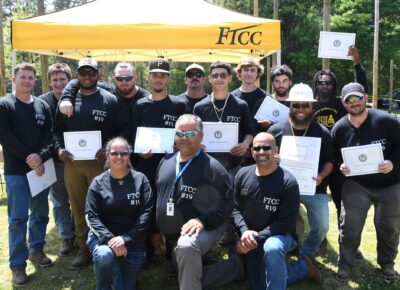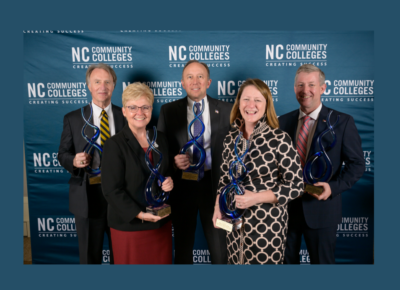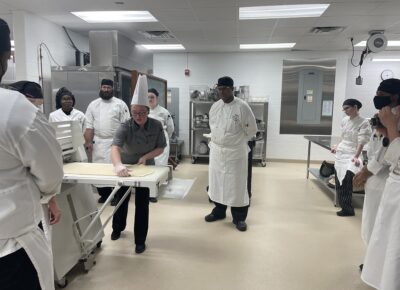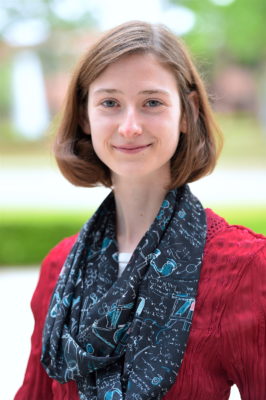
Grace Gore [Photo/Brad Losh]
North Carolina State University’s Goodnight Scholars Program named Grace Gore, a second-year student at Fayetteville Technical Community College, one of its 30 finalists who will participate in its first Transfer Finalist Interview Saturday in Raleigh. Then, the program will chose 15 students to join the program’s Transfer Class of 2021, according to a press release from the university.
Gore was chosen from an original pool of 107 applicants statewide.
Gore, 20, sat in the lobby of our campus’ Harry F. Shaw Virtual College Center (VCC) Monday. She didn’t need to speak about her love for science. Her passion for the subject layered around her neck in the shape of a navy-colored scarf. The scarf showed equations with solutions, beakers filled with liquid, smoke wafting from cylinders and colored molecules. Gore hasn’t “officially” celebrated her finalist status yet. Instead, she’s received lots of warm hugs from her family – her father and mother, Ashley and Ruth Gore and three siblings.
“This program is a wonderful opportunity,” Gore said. “When I applied to NC State, I received a notification about this program, and before I was accepted [to NC State], I learned I was one of the 30 finalists. I’m really excited for the possibilities: travel, the social aspect and gaining professional skills.”
NC State established the Goodnight Scholars Program in 2008, thanks to a generous gift from its namesakes Dr. Jim Goodnight, a State alumnus, and Ann Goodnight. The university describes the program as an investment that “has grown into a comprehensive student development program designed to empower scholars to be influential leaders and contributors within Science, Technology, Engineering and Mathematics (STEM) and/or education fields,” geared toward low- and middle-income families across North Carolina, according to the program’s website. More than 210 students have received the scholarship each academic year, its website states. Recipients meet with local and national STEM leaders, participate in workshops and even travel internationally for service projects.
The scholarship’s value is up to $20,000 annually and renewable for up to four years.

Grace Gore studies inside the Paul H. Thompson Library [Photo/Brad Losh]
“We are excited to welcome these finalists to our first-ever Transfer Finalist Interview Day,” Allison Medlin, director of the Goodnight Scholars Program, said in the press release. “This promises to be a wonderful new tradition for our Program, and we are thrilled to kick it off with such a talented and accomplished group of finalists. We hope they leave the interview day with an even greater appreciation for the wealth of opportunities available to them at NC State.”
Gore will graduate a double major from FTCC in May; she earned her associate’s degree in science in December and will earn her art degree next month. Gore learned as a home school student under her mother. Ruth Gore incorporated aspects of natural sciences into lesson plans such as hatching box turtles. Gore didn’t learn in a traditional classroom until she enrolled at FTCC as a High School Connections student.
“Science was never estranged from me, and I’ve liked it from a young age,” Gore said. “I’ve always been interested in why things are the way they are from a minute level, even from sitting in a lecture where something is so abstract but has a definite cause.”
Ruth Gore thought her youngest daughter would lean more toward the arts for a career. She said Gore sings, plays the piano and creates pencil sketches. She also cooks, personally grinding wheat into the flour she uses for baking.
“She and I read aloud – exhaustively – books from her list of 100 classics she wanted to finish before leaving school,” Ruth Gore added with a laugh.
Ruth Gore realized her youngest daughter chose science after she took a chemistry class at FTCC and “fell in love with it.”
“She said this is what she wants to do,” Ruth Gore said. “I told her to seek instructors who were passionate about their field because they make a subject come alive. Now, she considers her instructors her friends. They’ve been a marvelous influence.”
Her mother added, “I’m amazed at how she came home from school every day, and I would say, ‘How was school?’ and she would say ‘Fantastic!’ I think her attitude made her experience everything it could be. I don’t think [NC State] can choose a better candidate who can make the most of every opportunity in the program. I sure am going to miss having her under the same roof.”
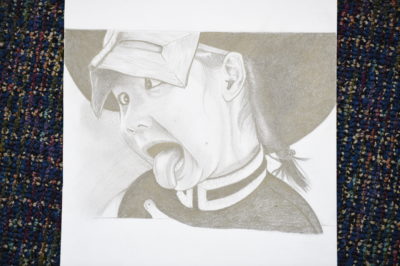
A pencil sketch drawn by Grace Gore, one of her favorite hobbies [Photo/Brad Losh]
Gore still hasn’t decided what career path in science she wants to pursue. She plans to study biochemistry and desires to work as a researcher, maybe in genomics (a branch of molecular biology concentrating on genomes) or maybe enzymology (a branch of biochemistry focused on enzymes). Gore also credits her eldest sister, Anna, as an influence. She, too, attended FTCC and transferred to Methodist University. Anna now works as a cellular microbiologist, Ruth Gore said.
“She set the precedent for my interests in science,” Gore explained. “She brought it to me in a real way with talking about her experiences in college, in travels and more. She pioneered the science route for me.”
Gore understands the importance of not just the scholarship, but also her interests in STEM as a woman. The field has been criticized through the years for having few women in the field. Reasons found have been from a challenging culture to in 2008, research showed 52 percent of women left companies in the STEM field in droves, an article from the Harvard Business Review stated. Also, women aren’t seen as recognizable role models throughout the field, a January article from Forbes revealed.
“I feel I have a bit of responsibility to encourage anyone, particularly young women, to be involved in STEM,” she said. “My sister encouraged me. I know there are women who need that in their life.”
Gore didn’t seem nervous about the final interview at the university she could attend for the next two years. She had something else on her mind as she occasionally checked the time outside of the VCC building. Her class at noon was minutes away from starting just as the sprinkles of rain disappeared into the sidewalk.



